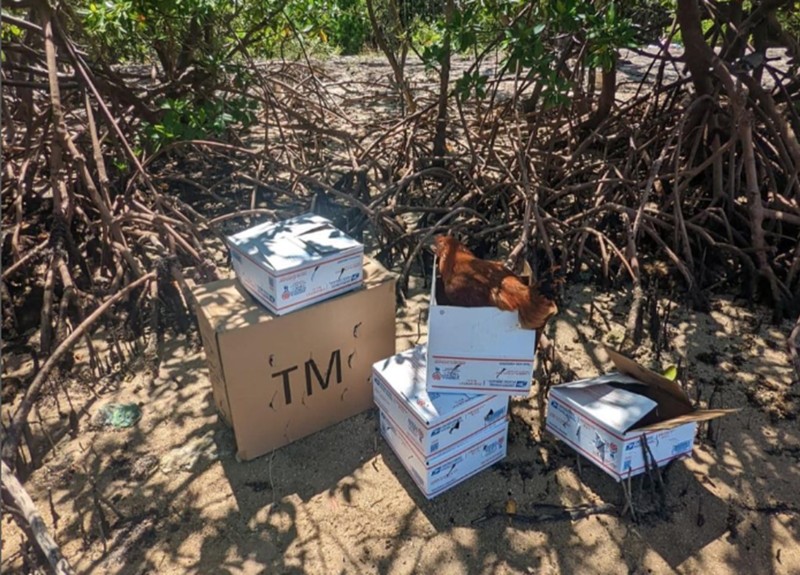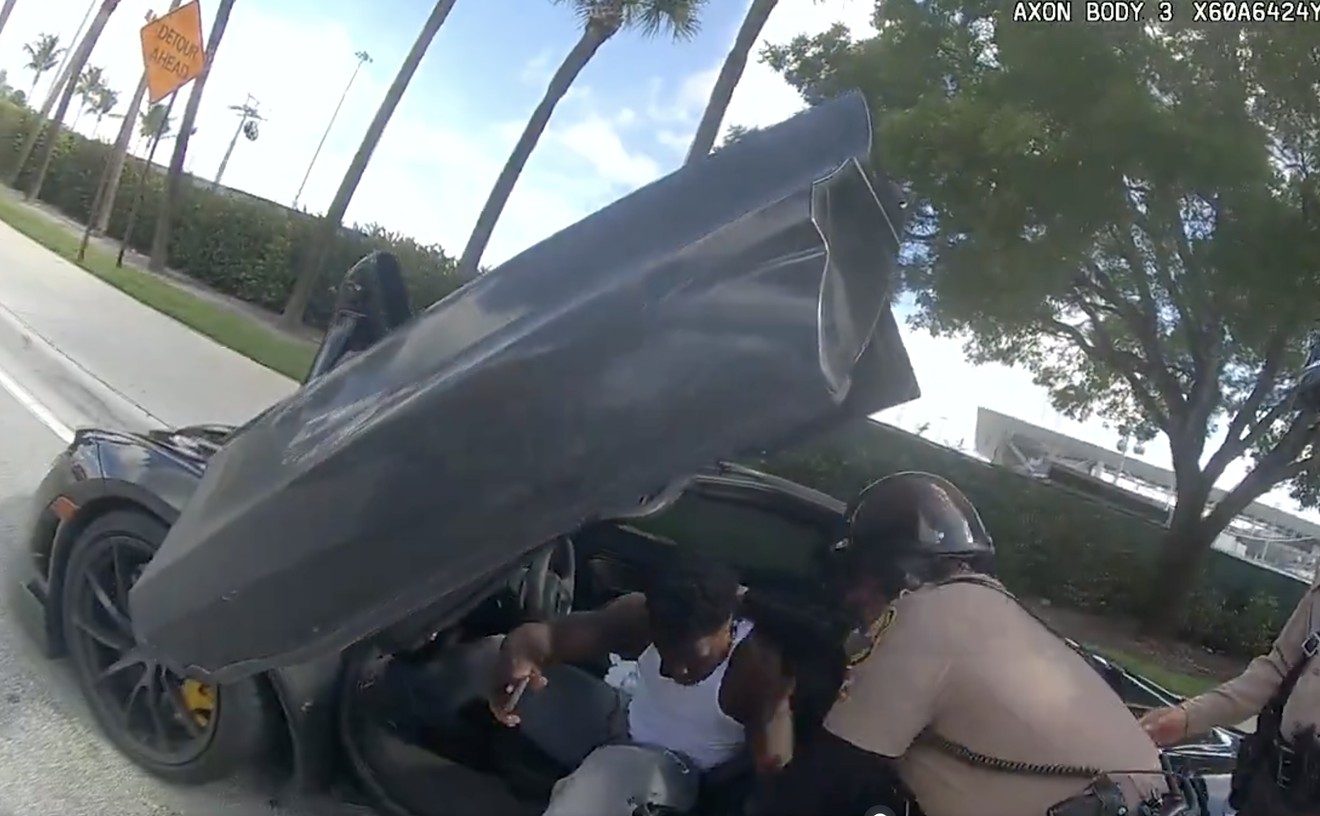Update published 7:15 p.m. 6/28/22: The Metro-Dade Police Department has apprehended a suspect in the case. See end of article.
As wilderness guides at the Virginia Key Outdoor Center were wrapping up a summer-camp kayaking tour on Monday afternoon, they noticed stacks of cardboard boxes that appeared to be moving on their own.
Inside the boxes: eight chickens and 22 pigeons, apparently destined for ritualistic sacrifice carried out by two men who were hiding in the nearby mangroves.
"These two guys came out and my volunteers got spooked. As soon as I heard about it, I knew what was happening: It was Santería," recounts Esther Alonso, who owns the outdoor center, located off the Rickenbacker Causeway at the northern tip of Virginia Key.
Alonso tells New Times that she approached the men as they were cutting the necks of two adult hens and gathering the blood. She screamed at the men in an effort to scare them away from the animals and out of the park.
"I went full 'Karen' on them. I figured if I said something crazy enough, they'd get scared," she says. "I told them, 'These chickens are under my protection. You can't come and kill animals here. Ask your god who it is you're dealing with.'"
The pair eventually departed empty-handed — Alonso refused to allow them to take the birds — leaving the staff at the outdoor center to clean up the mess: blood spilled on rocks and on branches of nearby mangroves, and a henhouse's worth of fowl."I went full 'Karen' on them. I told them, 'You can't come and kill animals here. Ask your god who it is you're dealing with.'"
tweet this
Later that evening, the outdoor center posted about the incident on its Instagram, including video of the six rescued hens and several pigeons hiding in a cardboard box.
"If we can arrest someone for throwing balloons in the bay why can't we arrest these two guys for killing two chickens spreading their blood in our shoreline, leaving their beheaded corpses wrapped in plastic bags on our beaches," read the post, referring to the arrest of two people earlier this year for dumping popped balloons at the Bayshore Landing Marina in Coconut Grove.
Alonso says volunteers released the pigeons at the request of their owner, a Miami resident who contacted the outdoor center after seeing the Instagram post. The caller told the center that 11 of the 22 racing pigeons flew home but he's still missing the others, including one bird he says is worth $2,000.
The surviving hens are safe at Alonso's home. She says she'll post photos of them on a local forum to find their owners, as their clipped wings lead her to believe they too were stolen.
Santería, an Afro-Cuban religion that's practiced in and around Miami, sometimes calls for the ritualistic sacrifice of animals, including chickens and goats. In 1993, after the City of Hialeah passed a law prohibiting animal sacrifice, the U.S. Supreme Court affirmed the right of Santería practitioners to sacrifice animals.
Santería, also known as Lucumí, is one of many Afro-Cuban religions that's practiced in and around Miami and within the Cuban diaspora. Like other Afro-Cuban religions, Santería sometimes calls for the ritualistic sacrifice of animals. In 1993, after the City of Hialeah passed a law prohibiting animal sacrifice, the U.S. Supreme Court affirmed the right of Santería practitioners to sacrifice animals.
That said, while Miamians often invoke Santería when animal remains are found in public spaces, that stereotype can be misleading, says anthropologist Martin Tsang, a Lucumí priest and librarian of the University of Miami's Cuban Heritage Collection.
"From the majority of practices, it is very difficult to ascribe a specific religion to a particular instance and say 'this is 1000 percent Santería,'" Tsang tells New Times.
Because the majority of Santería practitioners do not publicly identify themselves as such or discuss sacred and private ritual practices, Tsang notes, it's difficult to say for certain which ceremonies are done in the name of Santería versus other religions, including those that lie completely outside the Afro-Atlantic realm.
With regard to the chicken slaughter at Virginia Key, Tsang says, "I do not know any bona fide practitioners who would do this — going out to sacrifice in a public space. Sacrifice within the Orisha context is very delicate, very respected, and conducted in a sacred context. It is not entered into lightly.
"It is impossible to say from the description given what exactly this instance has to do with Santería — if anything," he adds.
At any rate, Esther Alonso contends that sacrificing animals near the outdoor center constitutes environmental pollution and can be scarring for children who visit.
"If you want to practice your religion, do it in the privacy of your facilities," says Alonso, who is Cuban. "This is a public park for public enjoyment, and these sacrifices are unsanitary and pollute the environment."
Alonso adds that this wasn't the first time she encountered evidence of ritualistic practices at Virginia Key.
"There used to be someone who would hang dead birds from the mangroves with the blood dripping out.
Can you imagine your kid walking down the trail and seeing that?"
Alonso says the center informed the Miami-Dade Police Department about yesterday's find and that the incident is under investigation for illegal dumping and, potentially, theft.
"The Miami-Dade Police Department initiated an investigation into the matter. Investigators were able to identify and locate [one of] the individuals involved in the incident," an MDPD spokesperson tells New Times. Dany Machado Gomez of Hialeah was issued $7,500 in civil citation fines for seven counts of animal cruelty and two counts of illegal dumping.













